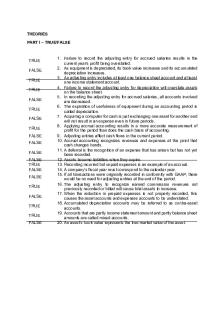Social inequality theories on topics from the book PDF

| Title | Social inequality theories on topics from the book |
|---|---|
| Course | Sociology |
| Institution | University of Guelph |
| Pages | 3 |
| File Size | 73.5 KB |
| File Type | |
| Total Downloads | 53 |
| Total Views | 127 |
Summary
Short paper on topics from the book and from topics provided. around 2 pages in total. explanations and theories explained...
Description
Structural Functional Theory: The Davis- Moore Thesis (Macionis et al., 2020, chap. 11, 19).
Points to ways social stratification helps society operate
In caste systems, people are rewarded for performing the duties of their position at birth
In class systems, unequal rewards attract the ablest people to the most important jobs and encourage effort.
The greater the functional importance of a position, the more rewards a society attaches to it.
This strategy promotes productivity and efficiency because rewarding important work with income, prestige, power, and leisure encourages people to do these jobs and to work better, longer, and harder
Unequal rewards, the essence of social stratification benefit society as a whole
They claimed that any society could be egalitarian but only to the extent that people are willing to let anyone perform any job
Equality would demand that someone who carries out a job poorly be rewarded the same as someone who performs well o There would be less incentive for people to try their best and reduce society’s productive efficiency
These points out that the socio-economic positions a society considers more important must carry enough reward to draw talented people away from less important work
Social Conflict Theories: Karl Marx and Max Weber (Macionis et al., 2020, chap. 11, 20).
Claims that stratification divides societies in classes, benefiting some categories of people at the expense of others and causing social conflict
Karl Marx claimed that capitalism places economic production under the ownership of capitalists, who exploit the proletarians who sell their labour for wages.
Argues that rather than benefiting society, social stratification benefits some people and disadvantages others.
Marx explained that capitalist society reproduce the class structure in each new generation. This happens as families gain wealth and pass it down from generation to generation o Predicted that oppression and misery would drive the working majority to come together and overthrow capitalism
Denies a central idea of the Davis-Moore thesis: that a system of unequal rewards is necessary to place talented people in the right jobs and to motivate them to work hard o Marx separated reward from performance “from each according to his ability, to each according to his needs” o Failure to reward individual performance may be what caused the low productivity of the former Soviet Union and other socialist economies
White-collar workers do not consider themselves industrial proletariats
However, wealth remains highly concentrated, white-collar work offers little to workers, progress requires struggle, and the law still favours the rich
Max Weber agreed with Karl Marx, but instead he claimed that social stratification involves three dimensions of inequality: o Economic inequality: class position o Status or social prestige: occupation, like being a physician, professor, or executive
o Power: political power o Socio-economic status refers to a composite ranking based on various dimensions of social inequality
Marx thought that societies could eliminate social stratification by abolishing the private ownership of productive property that is the basis of capitalism. Weber doubted that overthrowing capitalism would significantly lessen social stratification. It might reduce economic differences, but socialism would increase inequality by expanding government and concentrating power in the hands of a political elite.
Symbolic-Interaction Theory: (Macionis et al., 2020, chap. 11, 21).
People socialize primarily with others of the same social standing
Conspicuous consumption refers to buying and using products because of the statements they make about social position.
People’s attitudes about social inequality reflect not just facts but also politics and values concerning how a society should be organized.
Are unequal rewards fair? Maybe, people may or may not define inequality as fair. People may view their social position as a measure of self-worth, justifying inequality in terms of personal differences....
Similar Free PDFs

Social Inequality Worksheet
- 4 Pages

Comfort assessment - from the book
- 12 Pages

Social Science Theories
- 21 Pages

Essay on the book Macbeth
- 2 Pages

Theories on Accounting
- 4 Pages

Assignment ON Leadership theories
- 14 Pages

Durkheim Essay on Theories
- 9 Pages

Ch. 6 Social Structure Theories
- 6 Pages
Popular Institutions
- Tinajero National High School - Annex
- Politeknik Caltex Riau
- Yokohama City University
- SGT University
- University of Al-Qadisiyah
- Divine Word College of Vigan
- Techniek College Rotterdam
- Universidade de Santiago
- Universiti Teknologi MARA Cawangan Johor Kampus Pasir Gudang
- Poltekkes Kemenkes Yogyakarta
- Baguio City National High School
- Colegio san marcos
- preparatoria uno
- Centro de Bachillerato Tecnológico Industrial y de Servicios No. 107
- Dalian Maritime University
- Quang Trung Secondary School
- Colegio Tecnológico en Informática
- Corporación Regional de Educación Superior
- Grupo CEDVA
- Dar Al Uloom University
- Centro de Estudios Preuniversitarios de la Universidad Nacional de Ingeniería
- 上智大学
- Aakash International School, Nuna Majara
- San Felipe Neri Catholic School
- Kang Chiao International School - New Taipei City
- Misamis Occidental National High School
- Institución Educativa Escuela Normal Juan Ladrilleros
- Kolehiyo ng Pantukan
- Batanes State College
- Instituto Continental
- Sekolah Menengah Kejuruan Kesehatan Kaltara (Tarakan)
- Colegio de La Inmaculada Concepcion - Cebu







